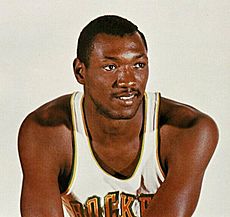Elvin Hayes facts for kids
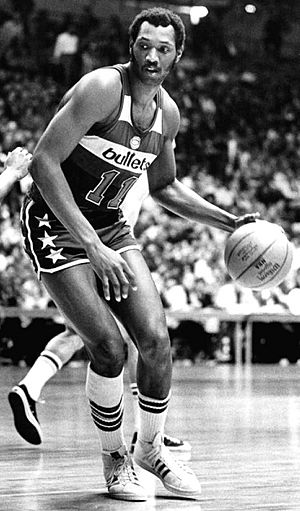
Hayes with the Washington Bullets in 1975
|
|
| Personal information | |
|---|---|
| Born | November 17, 1945 Rayville, Louisiana, U.S. |
| High school | Eula D. Britton (Rayville, Louisiana) |
| Listed height | 6 ft 9 in (206 cm) |
| Listed weight | 235 lb (107 kg) |
| Career information | |
| College | Houston (1965–1968) |
| NBA Draft | 1968 / Round: 1 / Pick: 1st overall |
| Selected by the San Diego Rockets | |
| Pro career | 1968–1984 |
| Career history | |
| As player: | |
| 1968–1972 | San Diego / Houston Rockets |
| 1972–1981 | Baltimore / Capital / Washington Bullets |
| 1981–1984 | Houston Rockets |
| As coach: | |
| 1984 | Houston Shamrocks |
| Career highlights and awards | |
|
|
| Career statistics | |
| Points | 27,313 (21.0 ppg) |
| Rebounds | 16,279 (12.5 rpg) |
| Blocks | 1,771 (2.0 bpg) |
Elvin Ernest Hayes (born November 17, 1945), known as "the Big E", is a retired American basketball player. He also worked as a radio analyst for his old college team, the Houston Cougars. Elvin Hayes is considered one of the best power forwards in NBA history. He is a member of the NBA's 50th and 75th anniversary teams. He is also in the Naismith Memorial Basketball Hall of Fame. Hayes played for 16 seasons and missed only nine games. This shows how tough and consistent he was.
Contents
Early Life and High School Basketball
Elvin Hayes grew up in Rayville, Louisiana. In his final year at Britton High School, he was an amazing player. He led his team to the state championship. During that season, he scored an average of 35 points per game. In the championship game, Hayes scored 45 points and grabbed 20 rebounds. His team won the state title.
College Basketball Career
Joining the Houston Cougars
In 1964, the University of Houston decided to recruit African American players. Coach Guy Lewis learned about Elvin Hayes from another coach, Isaac Morehead. Morehead thought Hayes was a top player. Coach Lewis sent his assistant, Harvey Pate, to watch Hayes play. Pate said Hayes was the best high school player he had ever seen. Hayes and Don Chaney became the first African American basketball players at the University of Houston.
Big Games and Records
In 1966, Hayes led the Houston Cougars to the Western Regional semifinals. They lost to the Oregon State Beavers. The next year, in 1967, Hayes led the Cougars to the Final Four. He scored 25 points and had 24 rebounds in a loss to the UCLA Bruins. That UCLA team had a famous player named Lew Alcindor, who later became Kareem Abdul-Jabbar. Hayes' 24 rebounds are the second-most ever in a Final Four game.
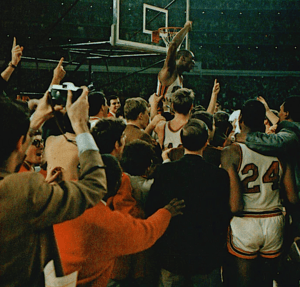
On January 20, 1968, Hayes and the Houston Cougars played against Alcindor and the UCLA Bruins. This was the first college basketball game ever shown on national TV during the regular season. It was called the "Game of the Century". A record 52,693 fans watched at the Houston Astrodome. Hayes scored 39 points and had 15 rebounds. He helped limit Alcindor to only 15 points. Houston won 71–69, ending UCLA's 47-game winning streak. This game helped Hayes win College Basketball Player of the Year awards.
Later that year, Hayes faced Alcindor and UCLA again in the 1968 NCAA Men's Division I Basketball Tournament semifinals. UCLA's coach, John Wooden, used a special defense to stop Hayes. Hayes was held to 10 points, and UCLA won 101–69.
Hayes was the top scorer for Houston in all three of his college seasons. He averaged 31.0 points and 17.2 rebounds per game during his college career. He holds the record for most rebounds in NCAA tournament history with 222.
Becoming a Top Draft Pick
After college, Elvin Hayes was the first player picked in both the 1968 NBA draft and the 1968 ABA draft. The San Diego Rockets picked him for the NBA.
Professional Basketball Career
San Diego / Houston Rockets (1968–1972)
Hayes joined the NBA with the San Diego Rockets in 1968. In his first year, he led the NBA in scoring with 28.4 points per game. He also averaged 17.1 rebounds per game. He was named to the NBA All-Rookie Team. Hayes is the last rookie to lead the NBA in scoring. He scored a career-high 54 points against the Detroit Pistons in November 1968.
In his second season, Hayes led the NBA in rebounding. He was the first player other than Bill Russell or Wilt Chamberlain to do this since 1957. In 1971, the Rockets moved to Houston. This allowed Hayes to play in the city where he had been a college star.
Washington Bullets (1972–1981)
In 1972, Hayes was traded to the Baltimore Bullets. He teamed up with another great player, Wes Unseld. Together, they led the Washington Bullets to three NBA Finals. These were in 1975, 1978, and 1979.
In 1978, Hayes and Unseld led the Bullets to an NBA championship. They beat the Seattle SuperSonics in the finals. This was the only NBA title for the Washington Bullets franchise. During that championship playoff run, Hayes averaged 21.8 points and 12.1 rebounds per game. On March 3, 1978, Hayes set a career-high with 11 blocks in one game. He also had 22 points and 27 rebounds in that game.
In the 1979 NBA Finals, Hayes set a record for most offensive rebounds in a game with 11. This record was later tied by Dennis Rodman.
Return to the Rockets (1981–1984)
Hayes wanted to finish his career in Houston. So, in 1981, he was traded back to the Houston Rockets. He played for the Rockets until he retired in 1984.
After Basketball
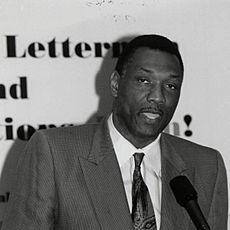
After his NBA career, Hayes went back to the University of Houston. He finished his college degree. He said it was "the hardest thing I've ever done."
In November 2007, Hayes became a Liberty County, Texas, sheriff's deputy. This was a dream he had since he was a child. In 2010, he started working as a analyst for radio broadcasts of Houston Cougars games.
On November 18, 2022, the Houston Rockets honored Elvin Hayes by retiring his jersey number, 44. This means no other Rockets player will wear that number.
Career Highlights and Honors
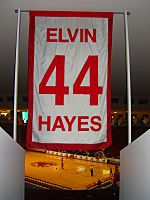
Elvin Hayes played 1,303 games over 16 seasons in the NBA. He scored 27,313 points, which is the twelfth most all-time. He also had 16,279 rebounds, which is the fourth most all-time. He is the all-time leading scorer for the Washington Bullets/Wizards. Hayes played in 12 straight NBA All-Star Games from 1969 to 1980. He holds the NBA record for total regular-season minutes played, with exactly 50,000.
Hayes was chosen for the Naismith Memorial Basketball Hall of Fame in 1990. In 1996, he was named one of the 50 Greatest Players in NBA History. In 2021, he was voted to the NBA 75th Anniversary Team.
In 2003, Hayes was inducted into the Breitbard Hall of Fame. This hall honors great athletes from San Diego.
NBA Career Statistics
| Legend | |||||
|---|---|---|---|---|---|
| GP | Games played | GS | Games started | MPG | Minutes per game |
| FG% | Field goal percentage | 3P% | 3-point field goal percentage | FT% | Free throw percentage |
| RPG | Rebounds per game | APG | Assists per game | SPG | Steals per game |
| BPG | Blocks per game | PPG | Points per game | Bold | Career high |
Regular Season
| Year | Team | GP | GS | MPG | FG% | 3P% | FT% | RPG | APG | SPG | BPG | PPG |
|---|---|---|---|---|---|---|---|---|---|---|---|---|
| 1968–69 | San Diego | 82 | — | 45.1 | .447 | — | .626 | 17.1 | 1.4 | — | — | 28.4* |
| 1969–70 | San Diego | 82* | — | 44.7* | .452 | — | .688 | 16.9* | 2.0 | — | — | 27.5 |
| 1970–71 | San Diego | 82 | — | 44.3 | .428 | — | .672 | 16.6 | 2.3 | — | — | 28.7 |
| 1971–72 | Houston | 82 | — | 42.2 | .434 | — | .649 | 14.6 | 3.3 | — | — | 25.2 |
| 1972–73 | Baltimore | 81 | — | 32.1 | .444 | — | .671 | 14.1 | 1.6 | — | — | 21.2 |
| 1973–74 | Capital | 81 | — | 44.5* | .423 | — | .721 | 18.1* | 2.0 | 1.1 | 3.0 | 21.4 |
| 1974–75 | Washington | 82 | — | 42.3 | .443 | — | .766 | 12.2 | 2.5 | 1.9 | 2.3 | 23.0 |
| 1975–76 | Washington | 80 | — | 37.2 | .470 | — | .628 | 11.0 | 1.5 | 1.3 | 2.5 | 19.8 |
| 1976–77 | Washington | 82 | — | 41.0 | .501 | — | .687 | 12.5 | 1.9 | 1.1 | 2.7 | 23.7 |
| 1977–78† | Washington | 81 | — | 40.1 | .451 | — | .634 | 13.3 | 1.8 | 1.2 | 2.0 | 19.7 |
| 1978–79 | Washington | 82 | — | 37.9 | .487 | — | .654 | 12.1 | 1.7 | .9 | 2.3 | 21.8 |
| 1979–80 | Washington | 81 | — | 39.3 | .454 | .231 | .699 | 11.1 | 1.6 | .8 | 2.3 | 23.0 |
| 1980–81 | Washington | 81 | — | 36.2 | .451 | .000 | .617 | 9.7 | 1.2 | .8 | 2.1 | 17.8 |
| 1981–82 | Houston | 82 | 82 | 37.0 | .472 | .000 | .664 | 9.1 | 1.8 | .8 | 1.3 | 16.1 |
| 1982–83 | Houston | 81 | 43 | 28.4 | .476 | .500 | .683 | 7.6 | 2.0 | .6 | 1.0 | 12.9 |
| 1983–84 | Houston | 81 | 4 | 12.3 | .406 | .000 | .652 | 3.2 | .9 | .2 | .3 | 5.0 |
| Career | 1,303 | 129 | 38.4 | .452 | .147 | .670 | 12.5 | 1.8 | 1.0 | 2.0 | 21.0 | |
| All-Star | 12 | 4 | 22.0 | .403 | — | .647 | 7.7 | 1.4 | – | – | 10.5 | |
Playoffs
| Year | Team | GP | GS | MPG | FG% | 3P% | FT% | RPG | APG | SPG | BPG | PPG |
|---|---|---|---|---|---|---|---|---|---|---|---|---|
| 1969 | San Diego | 6 | — | 46.3 | .526 | — | .660 | 13.8 | .8 | — | — | 25.8 |
| 1973 | Baltimore | 5 | — | 45.6 | .505 | — | .697 | 11.4 | 1.0 | — | — | 25.8 |
| 1974 | Capital | 7 | — | 46.1 | .531 | — | .707 | 15.9 | 3.0 | 0.7 | 2.1 | 25.9 |
| 1975 | Washington | 17 | — | 44.2 | .468 | — | .677 | 10.9 | 2.2 | 1.5 | 2.3 | 25.5 |
| 1976 | Washington | 7 | — | 43.6 | .443 | — | .582 | 12.6 | 1.4 | .7 | 4.0 | 20.0 |
| 1977 | Washington | 9 | — | 45.0 | .563 | — | .695 | 13.6 | 1.9 | 1.1 | 2.4 | 21.0 |
| 1978† | Washington | 21 | — | 41.3 | .491 | — | .594 | 13.3 | 2.0 | 1.5 | 2.5 | 21.8 |
| 1979 | Washington | 19 | — | 41.4 | .429 | — | .669 | 14.0 | 5.0 | .9 | 2.7 | 22.5 |
| 1980 | Washington | 2 | — | 46.0 | .390 | — | .800 | 11.0 | 3.0 | .0 | 2.0 | 20.0 |
| 1982 | Houston | 3 | — | 41.3 | .340 | — | .533 | 10.0 | 1.0 | .7 | 3.3 | 14.0 |
| Career | 96 | — | 43.3 | .464 | — | .652 | 13.0 | 1.9 | 1.1 | 2.6 | 22.9 | |
See also
 In Spanish: Elvin Hayes para niños
In Spanish: Elvin Hayes para niños
NBA Achievements
- List of NBA career games played leaders
- List of NBA franchise career scoring leaders
- List of NBA career scoring leaders
- List of NBA career rebounding leaders
- List of NBA career blocks leaders
- List of NBA career minutes played leaders
- List of NBA single-game blocks leaders
- List of NBA annual scoring leaders
- List of NBA annual rebounding leaders
College Achievements
- List of NCAA Division I men's basketball players with 2000 points and 1000 rebounds
- List of NCAA Division I men's basketball career rebounding leaders
 | James Van Der Zee |
 | Alma Thomas |
 | Ellis Wilson |
 | Margaret Taylor-Burroughs |


